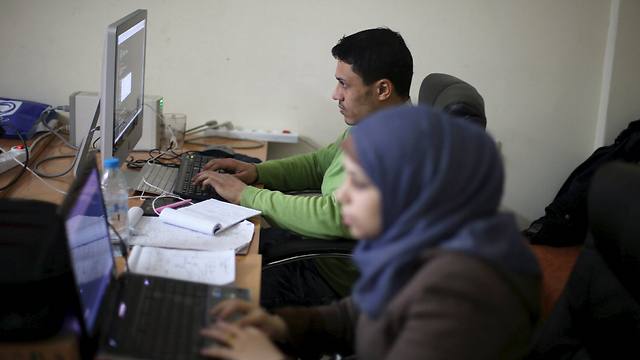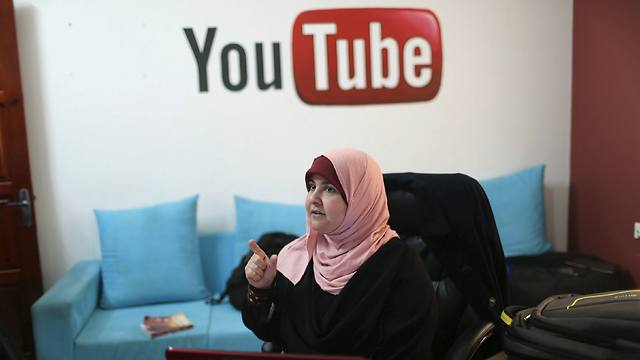Gaza may be physically cut off from the world under a blockade imposed by Egypt and Israel, but that hasn’t quashed the enthusiasm of young entrepreneurs who are getting guidance on their start-ups from the likes of Microsoft and Google.
Gaza may be physically cut off from the world under a blockade imposed by Egypt and Israel, but that hasn’t quashed the enthusiasm of young entrepreneurs who are getting guidance on their start-ups from the likes of Microsoft and Google.
Since 2011, a programme called Gaza Sky Geeks has helped identify and nurture high-tech start-ups in Gaza, with the “incubator” launching 16 businesses, including an AirBnB-style office space app and an online publishing platform.

In a strip of land where the economy is in turmoil, with 43 percent unemployment, Gaza Sky Geeks receives a steady stream of ideas from the large number of young, tech-savvy people among the territory’s 1.95 million population.
Initially set up with the help of Mercy Corps, a US-based charity, the programme is supported by Google.org and pulls in experts from other companies to offer guidance and advice, such as Facebook and YouTube.
“We provide mentorship and connections to investors for their companies to grow,” said Ryan Sturgill, the program director who spends the week working in Gaza and weekends in Jerusalem with his family.
“(It’s) coaching day to day to help develop ideas into companies that can scale across the region and world,” he said.
Last year, the incubator took 22 projects under its wing, five of which were successful enough to attract wider Arab investment and one of which is now a registered company.
TebCare is a “doctors on demand” service for the Arab world, while Walk and Charge has developed a wearable insole that lets someone charge their mobile phone as they stroll along.
Tim Park, a principal software engineer at Microsoft who was recently in Gaza to provide guidance at the incubator, said many of the ideas he encountered were aimed to resolve specific shortages or challenges faced in Gaza.
Israel has restricted the passage of goods into the Gaza Strip since 2007 when it was taken over by Islamist group Hamas. The two sides have fought four wars in Gaza in the past 10 years. Egypt also keeps its single crossing with Gaza largely closed.
Lack of fuel causes blackouts for up to eight hours a day and hospitals complain of shortages in medicine and medical equipment.
Park said most of the apps developed by Gaza Sky Geeks addressed problems found in other parts of the Arab world.
“The start-ups are all focused on solutions that could help not just Gaza but also the pan-Arabic speaking region,” Park told Reuters. “This is great – it really helps them get to a commercially viable scale.”
So popular has Gaza Sky Geeks become among young graduates – around 60 percent of whom are estimated to be unemployed – that it has more than 2,000 people registered on its database.

World reach
One of the success stories is Baskalet (Arabic for bicycle), a studio that develops games for the Arabic-speaking world. Its first game secured more than 100,000 downloads in the first three weeks and it aims to release six new games a year.
“We want to preserve the Arab nature, the Arab culture shared by 300 million people in the Arab world,” said Basil al-Madhoun, who is in charge of public relations.
As part of that effort, Baskalet has developed a game that is akin to an Arabic version of Spider Man. But rather than Peter Parker catching the crooks, the hero is called Hanafi.
When Park and his team at Microsoft gave a talk at Gaza Sky Geeks’ offices a few days ago, dozens of would-be entrepreneurs, including many women, crammed into the space to listen.
He told them that Internet-based businesses can reach anywhere in the world and that the Arab world is a rich source of business.
“All of the companies I talked with showed the potential to become a larger enterprise given their focus on the larger Arabic speaking markets,” Park said later via email.
Required was a good education system, access to capital and a culture that accepts that many ideas will fail. Gaza has plenty of the first and third, he said, but lacks access to capital.
Israel, which borders Gaza on two sides, has earned the nickname “start-up nation” for the number of high-tech businesses it has brought to market.
“The key thing that has made Israel successful is access to capital and government policies that make it very attractive to invest,” Park said. “This is the main thing that differentiates the Gaza environment from the Israeli environment.”
As reported by Ynetnews
